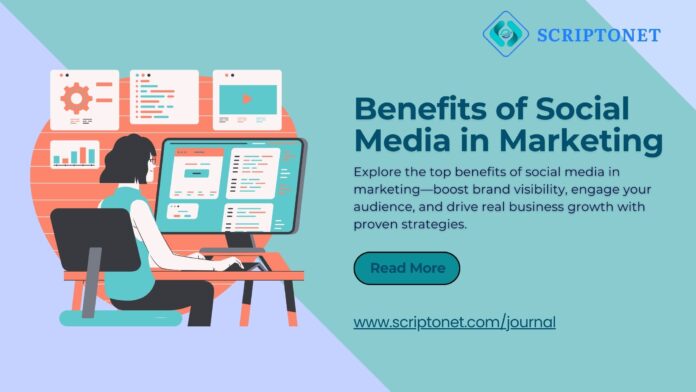Introduction
Social media has transformed the marketing landscape, offering businesses unprecedented opportunities to connect with their target audiences. Social media has several advantages for marketing, such as increasing sales, cultivating client loyalty, and raising brand exposure. By leveraging the vast reach & interactive nature of social media, companies can engage in real-time conversations, gather valuable customer insights & tailor their marketing strategies for maximum impact.
This digital realm allows for cost-effective advertising, targeted campaigns & the potential for viral marketing, making it an essential component of modern marketing strategies. Businesses can utilize social media analytics to understand audience behavior, optimize content & measure the effectiveness of their campaigns. Furthermore, social media enhances customer service by providing a direct channel for addressing inquiries & resolving issues, ultimately strengthening brand reputation & customer satisfaction.
Benefits of Social Media in Marketing
Increased Brand Awareness
Increased brand awareness through social media is essential for businesses seeking to expand their reach. The ability to reach a global audience with minimal cost is a significant advantage. Unlike traditional advertising, which often requires substantial financial investment for limited reach, social platforms offer the potential to connect with individuals across the globe. This accessibility allows businesses of all sizes to establish a presence & cultivate a wider customer base. Consistent posting of engaging content, coupled with strategic use of hashtags & targeted advertising, can significantly amplify brand visibility & introduce your business to new demographics. This expanded reach translates into more potential customers becoming familiar with your brand & its offerings, laying the groundwork for future interactions & conversions.
Engaging with potential customers through interactive content is another critical component of boosting brand awareness. Social media platforms are designed for interaction & businesses can leverage this by creating content that encourages participation. Polls, quizzes, contests & live Q&A sessions are excellent ways to spark engagement & foster a sense of community. By actively responding to comments & messages, businesses can demonstrate that they value customer feedback & are genuinely interested in building relationships. This interactive approach not only makes the brand more approachable but also helps to create memorable experiences that stick with potential customers. This engagement drives conversations & allows for the organic sharing of your content, further spreading brand recognition.
Building brand loyalty through a consistent online presence is essential for long-term success. Social media allows businesses to maintain a continuous dialogue with their audience, ensuring that their brand remains top-of-mind. Regular posting of relevant & valuable content, coupled with consistent branding & messaging, reinforces the brand’s identity & builds trust. By providing excellent customer service & addressing concerns promptly, businesses can demonstrate their commitment to customer satisfaction & build a loyal following.
A consistent online presence not only increases brand recognition but also fosters a sense of familiarity & reliability, which are crucial for building lasting customer relationships & driving repeat business. This consistency & dedication to customer engagement solidifies a brands position within the market.
Targeted Advertising & Analytics
Targeted advertising & analytics on social media platforms empower businesses to leverage data-driven insights, ensuring that their marketing efforts reach the most relevant audience. By utilizing the wealth of demographic, interest & behavioral data available, companies can pinpoint specific segments of their target market, maximizing the effectiveness of their advertising spend. This precision targeting allows for the delivery of personalized messages to individuals who are more likely to be interested in the products or services offered. This focus on relevance reduces wasted ad spend & increases the likelihood of conversions, leading to a higher Return on Investment (RoI) & more efficient marketing campaigns. The ability to refine your audience & tailor your approach, ensures that marketing resources are used effectively.
Customizing ads based on demographics, interests & behavior is a crucial aspect of targeted advertising. Social media platforms provide sophisticated tools that allow businesses to create highly tailored ad campaigns. This includes the ability to target users based on age, gender, location, interests, online behavior & even past purchase history. By leveraging this granular level of targeting, businesses can create ads that resonate with specific audience segments, increasing engagement & driving conversions. For instance, a clothing retailer can target ads to men aged 25-35 who are interested in fashion & have recently visited their website.This level of personalization ensures that ads are relevant & appealing to the target audience, leading to higher click-through rates & improved campaign performance. This customization & adaptability, allows for a campaign to evolve with its target audience.
Tracking performance & optimizing campaigns in real time is essential for maximizing the effectiveness of social media advertising. Social media platforms provide robust analytics tools that allow businesses to monitor the performance of their ad campaigns. This includes tracking metrics such as reach, engagement, click-through rates & conversions. By analyzing these metrics, businesses can gain valuable insights into what is working & what is not.
This data-driven approach allows for real-time optimization of campaigns, enabling businesses to adjust their targeting, messaging & creative to improve performance. For example, if an ad is performing poorly with a particular audience segment, businesses can quickly adjust their targeting or modify the ad creative to improve its effectiveness. This continuous optimization & monitoring ensures that campaigns are constantly improving & delivering the best possible results. This rapid response & analytical approach, allows for agile marketing campaigns.
Higher Engagement & Sales
Higher engagement & sales are key outcomes of a well-executed social media marketing strategy. Direct interaction with customers through comments & messages fosters a sense of community & builds strong relationships. Responding promptly to inquiries, addressing concerns & engaging in meaningful conversations demonstrates that a business values its customers. This direct line of communication allows for personalized interactions, which can lead to increased customer loyalty & repeat purchases. By actively participating in conversations & providing valuable insights, businesses can establish themselves as trusted authorities in their industry. This level of engagement not only strengthens customer relationships but also provides valuable feedback that can be used to improve products & services & directly increase positive word of mouth.
Utilizing influencer marketing is a powerful tactic to boost credibility & expand reach. Influencers have established a loyal following & are seen as trusted sources of information within their niche. By partnering with relevant influencers, businesses can tap into their audience & gain exposure to a wider pool of potential customers. Influencer marketing leverages the power of social proof & authenticity, which can be highly effective in driving sales. When influencers endorse a product or service, their followers are more likely to trust their recommendation & consider making a purchase. This strategy is particularly effective for reaching younger audiences who are more likely to rely on social media for product recommendations & purchasing decisions & also allows for the easy creation of user generated content.
Driving website traffic & conversions through social media links is a direct & measurable way to increase sales. Sharing engaging content, such as blog posts, product pages & promotional offers, with relevant links can direct traffic to a website. Social media platforms also offer features like shoppable posts & in-app purchasing, which allow customers to make purchases directly from the platform. By optimizing social media profiles & posts for conversions, businesses can streamline the customer journey & make it easier for customers to make a purchase.Tracking website traffic & conversion rates from social media allows businesses to measure the effectiveness of their campaigns & make data-driven decisions to improve results. This direct link between social media activity & website performance allows businesses to see a clear return on their investment & optimize their marketing efforts for maximum impact & also allows for easy tracking of ROI.
Conclusion
Social media marketing’s diverse advantages are clear, reshaping how businesses connect with audiences & stimulate growth. From boosting brand awareness through global reach & interactive content, to employing targeted advertising & analytics for precise audience engagement, social media provides a robust toolkit for contemporary marketers. Increased engagement & sales materialize through direct customer interaction, strategic influencer collaborations & streamlined website traffic conversions.
The capacity to cultivate brand loyalty, gather vital audience insights & optimize campaigns in real-time ensures social media’s continued relevance as a pivotal component of any comprehensive marketing strategy. As digital environments evolve, businesses effectively utilizing social media’s power will gain a competitive advantage, building enduring relationships & achieving sustained success.
Frequently Asked Questions (FAQ)
How do I create a successful social media strategy & what are the key components I should include?
Developing a winning social media approach requires setting specific objectives, pinpointing your ideal demographic, and choosing the most suitable channels. Essential elements include a content schedule that ensures regular posting, a brand tone guide that maintains consistent communication, and a plan for interacting with followers through comments and direct messages. Additionally, monitoring industry rivals and tracking key performance indicators are crucial to assessing the strategy’s impact. Understanding your audience and devising a plan to connect with them are critical steps in building a successful social media strategy.
What are the best tools & resources for managing social media accounts & how can they streamline my workflow?
A wide range of tools and resources are available to simplify and optimize social media management. Automated posting platforms such Buffer and Hootsuite can help plan and schedule content, while analytics platforms like Google Analytics provide valuable data on performance. Additionally, graphic design tools like Canva make it easy to create visually appealing content. By leveraging these tools, businesses can save time, boost productivity, and gain a deeper understanding of their social media strategy. Mastering these tools can help take marketing efforts to the next level.
How can I build a strong social media community & what tactics should I use to increase engagement?
Building a strong community involves consistently providing valuable content, actively engaging with your audience & fostering a sense of belonging. Tactics to increase engagement include running contests & giveaways, hosting live Q&A sessions & encouraging user-generated content. Responding promptly to comments & messages & creating interactive content like polls & quizzes, also promotes community growth. By interacting with your community & providing content they find valuable, you will build a strong social media presence.
How do I stay up-to-date with the latest social media trends & algorithm changes & how do I adapt my strategy accordingly?
Staying current requires continuous learning & adaptation. Follow industry blogs, attend webinars & monitor social media news for updates.Regularly analyze your performance data to identify trends & adjust your strategy. Participating in online communities & forums & experimenting with new features & formats, also helps you stay ahead of the curve. By staying informed & being willing to adapt, you will be able to keep pace with the changes in social media.
How do I handle social media crises & protect my brand’s reputation & what steps should I take to mitigate potential damage?
Handling social media crises requires a swift & transparent response. Develop a crisis communication plan, monitor social media for mentions of your brand & address negative feedback promptly & professionally. Acknowledge the issue, apologize if necessary & provide clear & accurate information. Taking the conversation offline for complex issues & implementing preventative measures like social listening, also helps mitigate damage. By having a plan in place& reacting quickly, you can protect your brand’s reputation.


